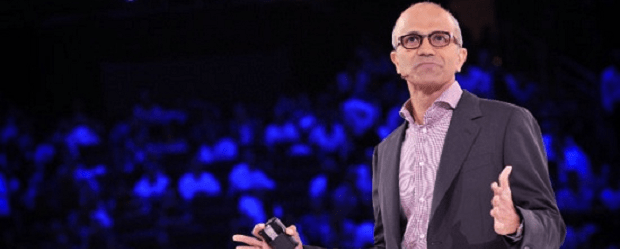Microsoft CEO Satya Nadella was doing some serious backpedalling in social media on Thursday after incurring the wrath of scores of women around the world following his comments (spoken at an event celebrating women in computing no less) that women should not ask for a raise because it was not “good karma.”
Nadella was speaking before a crowd of about 500 women at the 2014 Grace Hopper Celebration of Women in Computing event, in Phoenix, Ariz., when he made the gaffe. Hopper was an American computer scientist and United States Navy rear admiral. She was one of the first programmers of the Harvard Mark I computer, inventor of the first compiler for a programming language and she popularized the idea of machine-independent programming languages which led to the development of COBOL.
During the Q&A portion of the sold-out event, Nadella was asked by Maria Klawe, a member of Microsoft’s board of directors, for his advice to women who are not comfortable about asking for a salary increase.
“It’s not really about asking for a raise, but knowing and having faith that the system will give you a raise,” he answered. “That might be one of the initial ‘super powers’ that, quite frankly, women who don’t ask for a raise have. It’s good karma. It will come back.”
What did come back were “murmurs of indignation” from the attendees, according to report from the United Kingdom-based Daily Mail.
Disagreeing with Nadela, Klawe, a computer scientist, said women learn to negotiate for compensation She even recounted how she felt she lost out when offered a position as dean of engineering at Princeton University, she had settled for a salary of $50,000 which she thought was lower than what was appropriate at that time.
The CEO’s comments come a week after Microsoft released figures showing that women comprised 29 per cent of the company’s workforce and that 17 per cent of employees occupying positions of leadership were female.
Nadella’s comments also drew swift response on Twitter:
Is @satyanadella so out of touch with MS mgmt that he thinks u don’t need to push hard to get a raise, or is that just what he tells #GHC14?
— Leigh Honeywell (@hypatiadotca) October 9, 2014
“Dear Karma. We have a list of women you missed.”#Ask4More @levoleague @SallieKrawcheck @PaxEllevate @AmandaSteinberg pic.twitter.com/dA37HIW6C7 — Danetha Doe (@DanethaDoe) October 10, 2014
Ladies, if you are nt getting a raise dat might be because of the sins you commited in previous birth. Wait for ur good Karma. #Satyanadella
— Evelicious  (@_sugababes_) October 10, 2014
(@_sugababes_) October 10, 2014
Would #SatyaNadella tell his daughters in corporate jobs to trust Karma? That’s stuff that keeps glass ceiling firmly in place. #Microsoft — Rene Syler (@goodenufmother) October 10, 2014
Mystery of women’s pay gap cleared up. The missing 22% is in karma http://t.co/0XCd0xsXSl pic.twitter.com/GSmS4uzVmb
— Danny Sullivan (@dannysullivan) October 10, 2014
Nadella was quick to apologize on Twitter as well saying his remarks were “inarticulate”
Was inarticulate re how women should ask for raise. Our industry must close gender pay gap so a raise is not needed because of a bias #GHC14
— Satya Nadella (@satyanadella) October 9, 2014
— Satya Nadella (@satyanadella) October 9, 2014
Thanks for the feedback – further thoughts here: http://t.co/VbKkvsuv1N #GHC14
— Satya Nadella (@satyanadella) October 10, 2014
Nadella also sent a broadcast email to Microsoft employees saying his answer to Klawe’s question was “completely wrong.”
“Without a doubt I wholeheartedly support programs at Microsoft and in the industry that bring more women into technology and close the pay gap.,” he wrote. “I believe men and women should get equal pay for equal work. And when it comes to career advice on getting a raise when you think it’s deserved, Maria’s advice was the right advice. If you think you deserve a raise, you should just ask.”
In reality, it is not only in male-dominated industries that women suffer pay inequality, according to a business ethics expert.
“There are many reasons and expectations why men continue to be paid more than women are paid over their lifetimes,” said Marianna Fotaki, professor of business ethics at the Warwick Business School, in Coventry, U.K. “Karma, denoting reward for one’s deeds in their previous lives, sounds too absurd to be seriously considered by anybody had it not been touched upon a real and important issue: that is, why women continue to be paid less than men and why is this gender gap growing, especially in highly paid professionals?”
Not only are women working in highly paid male dominated professions such as accountancy, law, consultancy, business or academia paid much lower than their male counterpart, but “even in feminised sectors mend tend to be over-represented in the top paid jobs,” she said.
Fotaki cited a research by the American Association of University Women which shows that women typically earn about 90 per cent of what men are paid until they are about 35-years-old after which the median earning for women drop to about 75 to 80 per cent of what men are paid.
She said the narrowing of the pay gap tends to be confined in the early stages of a woman’s career. She also expressed alarm that while education in an effective tool for increasing earnings, “it is less effective in decreasing the gender pay gap.”
“…women cannot and should not wait for the enlightened bosses to grant the salary they have earned,” said Fotaki. “They have to be proactive in asking for a pay increase and learn how to successfully conduct such negotiations in order to change their predicament.”
In his letter to Microsoft employees, Nadella said he was looking forward to the Grace Hopper Conference “to learn.”
“…and certainly I learned a valuable lesson. I look forward to speaking with you at our monthly @&A next week and am happy to answer any questions you have,” Nadella said.






